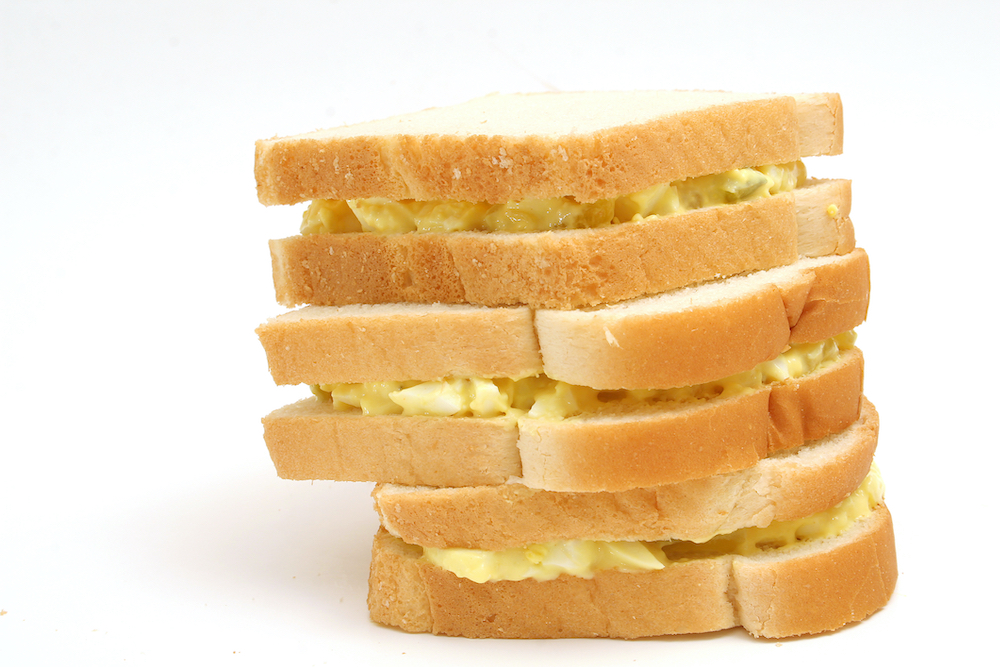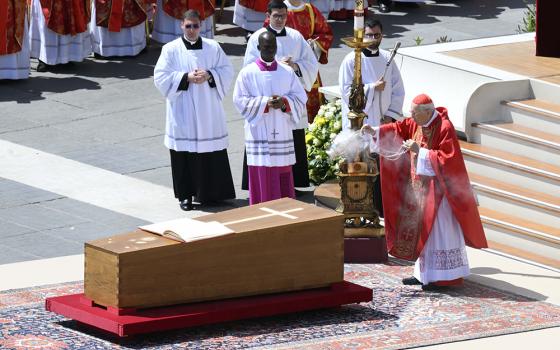
As a kid, I always dreaded the last Wednesday of the month. That was the day my mother made egg salad sandwiches. (Dreamstime/Andi Berger)
As a kid, I always dreaded the last Wednesday of the month. That was the day my mother made egg salad sandwiches. For hours afterward, the acrid, slightly metallic odor would linger in the kitchen. Even now, the mere thought of it fills the inside of my nose with phantom wisps of sulfur.
Unfortunately, my aversion held little sway with my mother. I was still expected to boil dozens and dozens of eggs, peel the shells and then douse the remains with heaps of Hellmann's mayonnaise. "Don't scrimp on the mayo," she would chide me." Those sandwiches need to be easy to chew."
For years, I served as my mother's sous chef. With assembly line precision, we would cover the kitchen table with slices of Wonder Bread, depositing a healthy dollop of egg salad on one slice before covering it with another. Once made, I would slip the sandwiches back into the plastic sleeve in which the bread had come. When we reached 120 sandwiches, my brother would carry the stacks out and placed them in the back of the car, headed to a rundown corner of Boston's Chinatown.
In the late 1960s, my hometown was consumed by racial tensions, the busing crisis and a contentious mayoral race between Louise Day Hicks and Kevin White. There was little political capital left to address the city's growing homeless population. In increasing numbers, those without shelter drifted from the Common into the streets of the "Combat Zone," Boston's red-light district, which was much larger then. Largely hidden from public view, their existence held little purchase for most. But an unlikely duo felt differently.
Advertisement
In 1969 a four-story brick building, originally scheduled for demolition, was reimagined by Paul Sullivan and Jim Buckley as a shelter for homeless men. With the support of the Association for Boston Urban Priests, their vision was realized. Named for the elbow-shaped street on which it was located, the Pine Street Inn offered its 200 daily guests "a hot and a cot." And, as it turns out, egg salad sandwiches.
During the past 50 years, the services provided by the Pine Street Inn have expanded exponentially. With their facility bursting at the seams, the shelter relocated in 1980 to the former Boston Fire House on Harrison Avenue. In 1992, women were welcomed into the shelter. Subsequent years saw the launch of a food training program, a dramatic increase in transitional and permanent housing stock and targeted care for the elderly and the mentally ill.
Much of this was still a pipe dream when my mother first started volunteering at Pine Street. She had heard of the two men who had taken on the challenge of caring for their compatriots. She also had a soft spot in her heart for how many of the homeless struggled with alcohol addiction, a condition that had rocked her own family. Sitting on a neighbor's porch one afternoon, cigarette in one hand and pen in the other, they compiled a list of women they thought would be willing to prepare food for the shelter. Before long, dozens of names were scratched onto the page. Armed with an idea and a cavalry, she cold called Paul Sullivan with an offer he couldn't refuse.
The egg salad sandwich crusade had officially begun.
By the time I got to be a tween, I was conscripted not only to make sandwiches but to serve them as well. My mother and I would drive through our neighborhood in a borrowed station wagon and gather sandwiches, fruit and sugary treats from the church ladies of St. Bartholomew Parish. By mid-afternoon, with the car smelling of egg salad, bananas and homemade cookies, we would head into Boston for our dinnertime debut.
One day, after pulling up to the curb in front of the shelter, my mother got out, swung open the tailgate and stuck the top half of her body into the car to commence unloading the boxes. Sensing an opportunity, one of the men, a toothless fellow with some serious hygiene issues, strode over and pinched my mother's bottom. Without missing a beat, she emerged from the rear of the car, looked him right in the eye and said pleasantly, "Why thank you. No one has done that in quite some time."
My mother's involvement with the men of Pine Street was truly a labor of love. The work did not intimidate her, and the conditions did not frighten her. Years later, there would be occasions where I would be with my mother on the streets of Boston and a homeless man would call out to her with a smile and a wave, recognizing her from years spent on the food line. She would just grin and wave right back, much to the puzzlement of those around us.
The calendar has now turned past my favorite Wednesday, the day that begins the Christian observance of Lent. This period of reflection has long resonated with me, a reminder of how vital it is to pair one's faith with action.
A "hot and a cot" and a good old-fashioned egg salad sandwich. That was the incarnation of my mother's faith. And now is the inspiration of my own.








